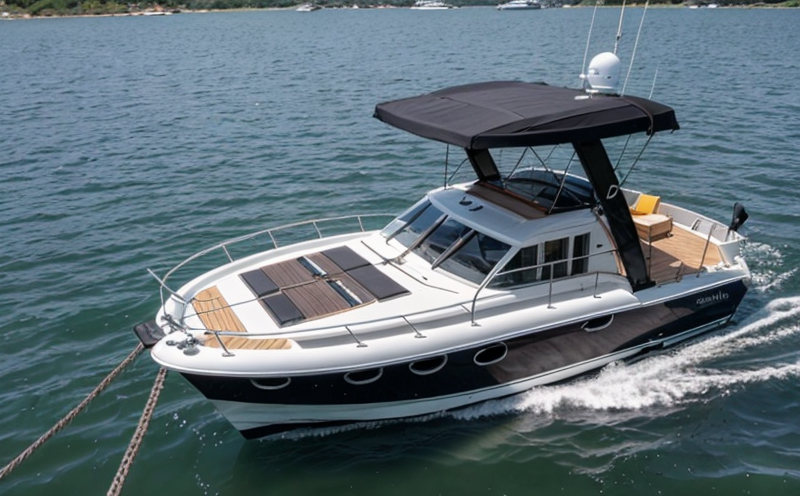ASTM G99 Abrasion Testing of Deck Equipment Surfaces
The ASTM G99 standard is widely recognized for its comprehensive approach to evaluating the abrasion resistance of materials, particularly in marine environments. This test method focuses on determining how well deck equipment surfaces withstand wear and tear, ensuring longevity and safety under harsh maritime conditions.
Marine & ship equipment, especially mooring, anchoring, and deck components, are subjected to continuous stress from environmental factors such as saltwater exposure, mechanical abrasion, and corrosive elements. The ASTM G99 test simulates these conditions by exposing the surface of deck equipment to an abrasive wheel under controlled pressure and speed. This helps in assessing not only the material's resistance but also its durability over time.
The significance of this testing lies in its ability to predict the lifespan of critical components, thereby enhancing safety standards on ships and marine structures. By adhering strictly to ASTM G99 guidelines, laboratories like Eurolab ensure that test results are accurate and reliable, providing stakeholders with confidence in the performance of their materials.
For instance, this method is crucial for evaluating wear-resistant coatings used in anchor chains or abrasion-resistant surfaces on deck winches. The test helps manufacturers and users understand which materials perform best under real-world conditions, allowing them to make informed decisions about material selection and maintenance schedules.
The ASTM G99 standard ensures that all tests are conducted consistently across different facilities, ensuring comparability of results. This is especially important in the marine industry where global standards help maintain consistent quality and performance expectations worldwide.
| Test Specimen | Environment Conditions |
|---|---|
| Solid or coated materials used in deck equipment | Marine environment, including saltwater exposure |
| Polymeric surfaces | High abrasion stress areas like anchor shackles |
| Test Procedure | Results |
|---|---|
| Specimen is placed in a rotating drum with an abrasive wheel. | Abrasion resistance measured in terms of weight loss or surface damage after defined cycles. |
| Pressure and speed are controlled to simulate real-world conditions. | Data points on material durability and performance over time. |
The ASTM G99 test is essential for ensuring that deck equipment meets the highest safety standards, especially in high-stress areas like anchor shackles or mooring lines. By using this method, manufacturers can ensure their products are reliable and safe for use in challenging marine environments.
Industry Applications
- Mooring equipment: Ensuring the durability of anchor chains and mooring lines against abrasion.
- Anchoring systems: Evaluating the wear resistance of shackles, swivels, and other components in harsh marine environments.
- Deck equipment: Assessing the longevity of deck winches, handrails, and other surfaces exposed to abrasive conditions.
| Application | Materials Evaluated |
|---|---|
| Mooring equipment | Cold-formed steel, galvanized steel, and polymer-coated materials |
| Anchoring systems | Titanium alloys, nickel-based alloys, and polymeric coatings |
| Deck equipment | High-strength stainless steels, coated abrasion-resistant surfaces |
The ASTM G99 test is particularly valuable for industries where the performance of materials under abrasive conditions can significantly impact operational efficiency and safety. By providing accurate abrasion resistance data, this method helps manufacturers design products that not only meet regulatory requirements but also enhance overall equipment reliability.
Eurolab Advantages
At Eurolab, we offer a range of services tailored to the unique needs of the marine industry. Our state-of-the-art facilities and experienced staff ensure that every test conducted is not only accurate but also consistent with international standards.
- Expertise in Marine Testing: With years of experience in marine-related testing, Eurolab provides comprehensive support for all aspects of deck equipment evaluation.
- Compliance Assurance: Our tests are conducted strictly according to ASTM G99 and other relevant standards, ensuring compliance with international regulations.
- Advanced Equipment: Equipped with the latest testing machines and software, Eurolab ensures precise and reliable results.
- Dedicated Team: Our team of experts is well-versed in marine materials and can provide guidance on material selection and performance.
Choosing Eurolab for your ASTM G99 abrasion testing needs means partnering with a reputable laboratory that offers not just accuracy but also unparalleled expertise. Whether you're a manufacturer, supplier, or quality manager, our services are designed to meet the highest standards in the industry.
Why Choose This Test
- Ensures Material Durability: The ASTM G99 test provides critical insights into material performance under abrasive conditions, helping to extend equipment lifespan.
- Enhances Safety Standards: By evaluating the abrasion resistance of materials used in deck equipment, this test contributes to safer operations at sea.
- Global Consistency: Conducted according to international standards, ensuring that results are comparable and accepted worldwide.
- Supports Regulatory Compliance: Ensures that your products meet all necessary regulatory requirements for marine applications.
- Promotes Innovation: Provides valuable data that can be used to improve product design and performance.
The ASTM G99 test is an indispensable tool for anyone involved in the production or evaluation of deck equipment. It offers a comprehensive approach to assessing material durability, contributing significantly to the safety and reliability of maritime operations.





